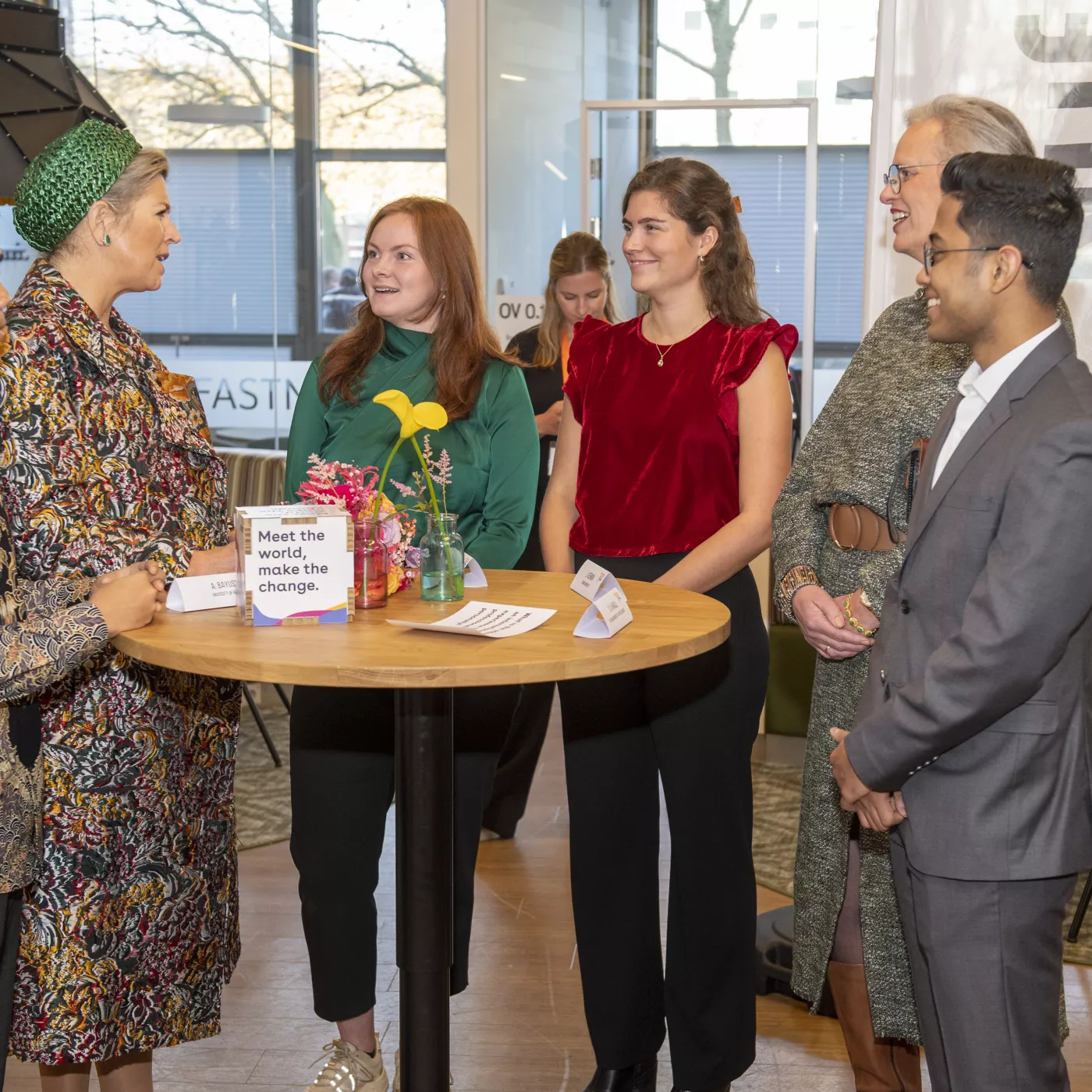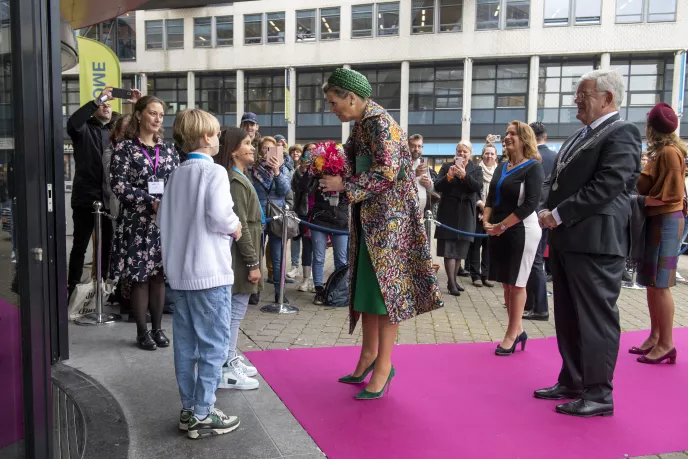‘A beautiful philosophy: creating space for change makers’

Over the past 70 years Nuffic has been the driver of internationalisation of education. During the festive jubilee event, stakeholders highlighted the different sides of our multifaceted organisation. It’s not just numbers of students going abroad; it’s the effect that internationalisation has on educational quality, stakeholders conclude.
‘Nuffic is one of our most important partner organizations’, says Kai Sicks (Secretary General, DAAD). ‘We have many things in common, we have the same world orientation. I mean that we both see education as a way to contribute to social challenges.’ There a five countries that share that philosophy and they cooperate closely, Sicks explains. ‘Nuffic is one of the big five, together with France, the UK, the US and Germany.’
In Germany the topic of internationalisation is not so politicized, not so sensitive as in the Netherlands. ‘That’s because of the lack of labour in Germany’, Sicks explains. Furthermore the stay rate – the number of incoming students finding long term employment – lies much higher in Germany than in the Netherlands: 54% versus 25%. The case for foreign students is therefore easier to make.
Division of labour
Donatienne Hissard, representing another one of the ‘big five’ – France – explains why internationalisation is crucial in our day and age. ‘All of todays big issues are global issues. We just cannot solve them at a national level: we need researchers who are adaptive, reflective and open-minded. For instance, in the south of France we cooperate with researchers from the other side of the Mediterranean to learn from them about heath and draught.’
‘It’s also a question a labour division’, Sicks adds. ‘When the world was looking for a covid-vaccine, two German scientists of Turkish origin came up with a vaccine. In Germany they couldn’t find the funding, so they teamed up with Pfizer in the US. Without international cooperation this wouldn’t have happened.’
'All of todays big issues are global issues. We just cannot solve them at a national level'
A trading nation
‘Young people today are growing up in a world that is completely globalized,’ observes Ewald van Vliet (Chairman of the Board, Stichting Lucas Onderwijs). ‘Those who are introduced to it from a young age and are given the opportunity to gain an international experience will be better able to cope in that globalized world.’ The Stichting Lucas Onderwijs includes 86 secondary and primary schools and does many internationalization projects with Nuffic’s support.
‘Without Nuffic, we would have far fewer international contacts. Then our young people would not learn important skills. That would be very damaging for the Netherlands as a trading nation. We are a small country and a small language area with a completely open economy. If you don't adjust to that from a young age, it will be very difficult to adapt to that reality later.’
Cocreation in Benin
In Benin Nuffic is mainly known for it’s support in capacity building, describes Flora Josiane Chadare (National University of Benin). ‘In the last years the quality of education has been greatly improved. Cocreation helped to match our educational system better with problems in Benin.’ Together with Benin’s educational institutions, Nuffic has supported three academic institutions: on water, healthcare and food security.
Personally Ms. Chadare has also benefited from Nuffic: ‘I did my PhD in Wageningen with a Nuffic scholarship.’ Among other things she studied the effect of food fortification – with iron and other minerals – on malnutrition in her country. A real example of ‘knowledge valorisation’, she calls her research. ‘Now we can improve the Boabab products that people eat with local ingredients that are more nutritious.’
Article continues below photo.

Studying far abroad
For Iris Klein Gunnewiek, the Nuffic experience lay abroad: as a student International Tourism Management she did her internship in Melbourne, Australia. ‘I worked at a travel organisation, boosting their social media marketing.’ Looking back she learned a lot from this experience: ‘I’ve gained much more respect for other cultures to start with. Also on a professional level I’ve learned a lot.’ As ambassador of the WilWeg-programme she now supports other students who want to take the leap.
Looking at the political debate about inbound international students, Pieter Duisenberg (president of the Association of Universities of the Netherlands) thinks that the baby should not be thrown out with the bathwater. ‘We have to underline the added value of internationalisation, although that added value will vary from university to university and from region to region. We need diversified policy. That’s why I am glad that the Minister of Education will come up with a new vision on internationalisation this February.’
‘An organisation like Nuffic is necessary to guarantee that internationalisation really works. That diplomas of people from abroad are valued, for example. In addition, the cooperation with Nuffic has helped tremendously to help students who have fled from Ukraine get started in Dutch higher education.’
Duisenberg continues: 'Nuffic also regularly conducts studies: for example, on the likelihood that foreign students will find jobs and stay in the Netherlands. This ensures that the debate about internationalisation remains based on facts.’
'We have to underline the added value of internationalisation. That’s why I am glad that the Minister will come up with a new vision on internationalisation'
Nurturing changemakers
Ambassador Riaz Hamidullah of Bangladesh: ‘Our cooperation started with the water sector. You know: the Institute for Water Education in Delft (IHE) was founded on the request of Bangladesh in 1957. Today we still work with Dutch partners in the field of river dredging, but the cooperation has now spread all over the canvas.’
Ambassador Hamidullah got in touch with Nuffic when he started his posting 2,5 years ago. ‘I think Nuffic has a beautiful philosophy. Nuffic does more than simply providing support and scholarships, they also nurture ideas. They create space and subtly contribute to change makers.’ The real contribution, according to the ambassador, is that the work of Nuffic helps to build ‘a new kind of people’, somewhere between NGOs and entrepreneurs.
Diversity and talent mobility are crucial if countries want to meet al the challenges ahead, Ambassador Hamidullah strongly believes. ‘Look at the US: they profited from the talent from all over the world to fill the labour market gaps. It all depends on your narrative of mobility: do you chose a toxic narrative, or a constructive narrative? That’s the question.’
Take a look at the aftermovie of our jubilee event attended by her majesty Queen Máxima at The Hague University of Applied Science, 1 December 2022.